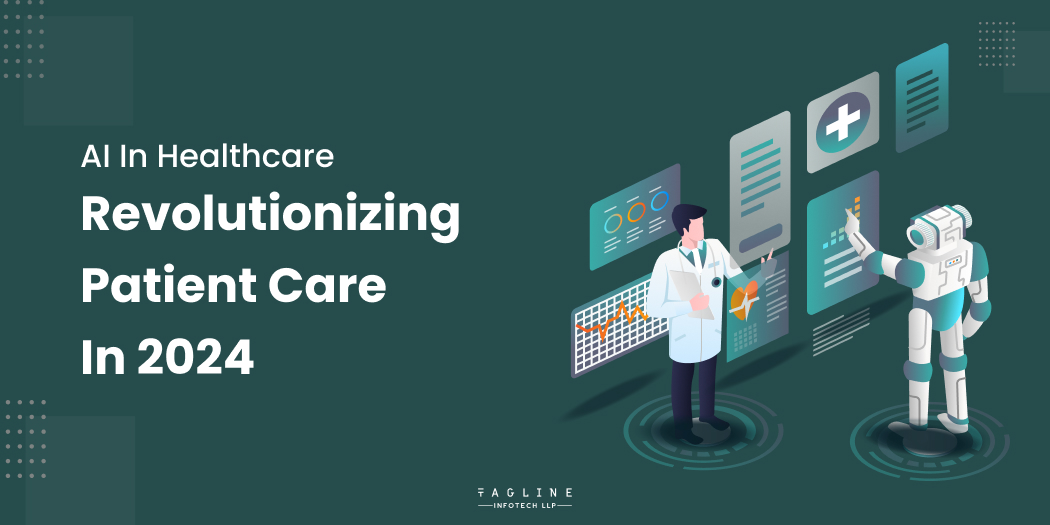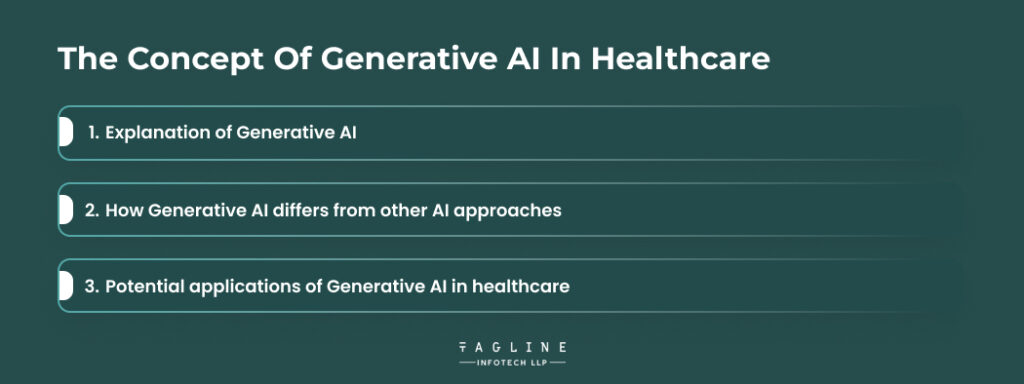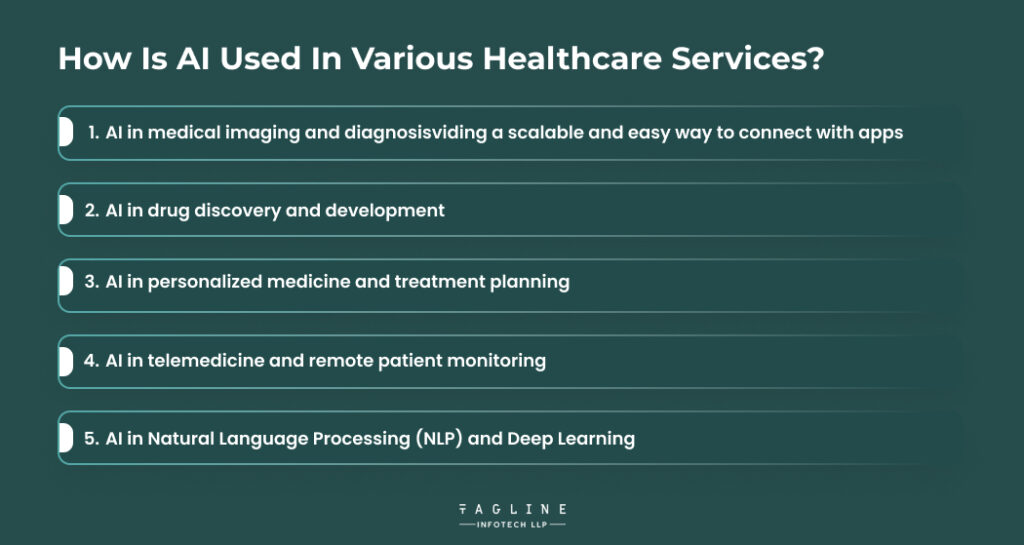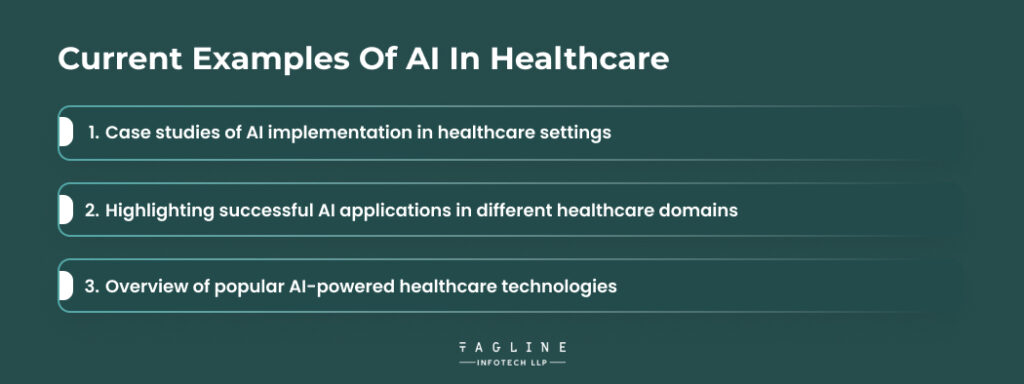How ChatGPT and RPA are Transforming Automation’s Future
May 17, 2024
Home >> Healthcare App >> AI in Healthcare: Revolutionizing Patient Care in 2024

Quick Summary
In today’s changing healthcare world, artificial intelligence (AI) is making a big difference. As we move through 2024, AI is becoming more and more important in healthcare. It’s changing how we care for patients, making things better, faster, and easier for people everywhere. AI helps doctors with tests, treatments, and finding new medicines. It even lets us keep an eye on patients from far away. With AI, doctors can learn new things, work more efficiently, and help patients even more. It’s like having a really smart helper by their side. And did you know? Almost all healthcare providers, life science companies, and tech vendors are using AI now.

Generative AI stands out as a specialized branch of artificial intelligence (AI) dedicated to generating novel data rather than solely analyzing existing information. Through advanced algorithms, it produces fresh content such as images, text, or music, closely resembling the input data it was trained on. In simpler terms, Generative AI functions as a tool capable of envisioning or crafting new elements based on patterns extracted from pre-existing data. In the realm of healthcare, Generative AI finds application by leveraging AI algorithms to fabricate new medical data, including images, patient records, or molecular structures, that mirror real-world scenarios. This synthesized data serves diverse purposes, from enriching existing datasets to facilitating drug discovery, refining medical imaging techniques, and tailoring patient care strategies.
Generative AI in healthcare diverges from other AI methods like predictive or classification models by focusing on creating new data rather than just analyzing existing information. This unique capability enables Generative AI to craft synthetic medical images and patient records, filling gaps where real data is scarce or sensitive. It serves as a virtual lab for training AI models and enhances low-quality medical images for clearer diagnoses. Moreover, it tailors personalized treatment plans based on individual patient data, revolutionizing the benefits of healthcare application solutions. Generative AI’s innovative approach makes it a game-changer in healthcare and beyond.
Generative AI in healthcare is transformative, notably in its synthesis of data. This advanced technology generates synthetic medical images, patient records, and other crucial data, vital when real patient information is scarce or sensitive. It’s pivotal in effectively training AI models and refining their precision and dependability in diagnosing and treating medical conditions. Moreover, Generative AI revolutionizes drug discovery by swiftly creating new molecular structures with desired traits, expediting the identification of potential drug candidates. It also enhances medical imaging by refining image quality, resolution, and reducing noise, leading to more accurate diagnosis and treatment planning. Additionally, in personalized medicine, Generative AI crafts tailored interventions based on individual patient data, enabling customized treatment plans and improving patient outcomes and care quality.

AI in healthcare, particularly in medical imaging and diagnosis, transforms healthcare with advanced technology like machine learning, deep learning, and computer vision. These methods analyze images from diagnostic tools like X-rays, MRI scans, CT scans, and ultrasounds. By automatically detecting abnormalities, AI aids radiologists and clinicians, expediting diagnosis and improving outcomes. Additionally, AI improves image quality, aiding clearer diagnosis and treatment planning, especially for subtle abnormalities. Predictive analytics and decision support systems predict disease progression and treatment response, informing decisions and improving outcomes. In summary, AI in medical imaging enhances diagnostic accuracy, efficiency, and patient care, enabling early detection and interventions for better healthcare.
AI in healthcare revolutionizes drug discovery by employing machine learning and deep learning algorithms to analyze extensive biological, chemical, and clinical data. This accelerates the drug discovery pipeline, optimizing development efficiency. AI expedites drug candidate identification, design optimization, and prediction of drug-target interactions. Additionally, it identifies biomarkers for disease diagnosis, patient stratification, and personalized treatment. Overcoming traditional challenges like lengthy timelines and high costs, AI enhances lead optimization and trial design, facilitating drug repurposing for new indications. Overall, AI transforms healthcare by expediting innovative therapy development, improving patient outcomes, and revolutionizing medicine delivery.
In healthcare, AI integration transforms personalized medicine, revolutionizing treatment planning for individual patient needs and optimized outcomes. AI analyzes extensive patient data, including genetics, medical history, and outcomes, revealing patterns and correlations not always apparent to humans. These insights enable tailored treatment plans based on genetic makeup, disease characteristics, and responses. AI predicts treatment responses and outcomes, optimizing efficacy while reducing adverse effects. Additionally, AI identifies biomarkers for diagnosis, prognosis, and treatment response, enabling early intervention and targeted therapies.
AI in healthcare revolutionizes telemedicine and remote patient monitoring, offering convenient, personalized solutions. AI streamlines virtual consultations and diagnosis, enabling remote connections with healthcare professionals. By analyzing symptoms and medical history, AI aids accurate diagnoses, reducing unnecessary hospital visits and costs. AI-driven remote patient monitoring systems analyze vital signs in real-time, detecting health risks early for proactive interventions, improving outcomes, and reducing readmissions. Overall, AI enhances access to quality healthcare, providing convenient and cost-effective solutions. As AI advances, its integration will further optimize patient care and disease management.
AI in healthcare evolves rapidly with Natural Language Processing (NLP) and Deep Learning. NLP extracts insights from clinical data like electronic health records, while Deep Learning analyzes medical images and predicts diseases. These applications streamline workflows, enhance diagnostic accuracy, and optimize patient outcomes. Efficient data analysis enables informed decisions, leading to accurate diagnoses, timely interventions, and personalized treatment plans. In summary, AI in healthcare, powered by NLP and Deep Learning, revolutionizes patient care and clinical decision-making, promising improved outcomes and experiences.

Here are current examples of AI in healthcare:
These instances illustrate how AI is transforming various sectors within healthcare, spanning diagnosis, treatment, and administrative functions, resulting in enhanced patient outcomes and streamlined healthcare delivery.
These technologies enhance diagnostic accuracy, treatment personalization, and operational efficiency in healthcare.
AI integration in healthcare presents substantial cost-saving opportunities. It simplifies administrative duties such as scheduling and billing, minimizing errors and manual effort. Predictive analytics identify high-risk patients, enabling proactive interventions that reduce hospitalization expenses. In medical imaging, AI improves accuracy, minimizing unnecessary procedures and treatment costs. Virtual health assistants facilitate remote consultations, decreasing travel expenses and wait times. Overall, AI enhances operational efficiency, patient care, and resource utilization, resulting in cost savings. As AI adoption expands, healthcare delivery becomes increasingly efficient and economical.
AI-driven healthcare services redefine revenue strategies for medical institutions by merging patient care with operational efficiency. Personalized healthcare plans leverage AI analysis for tailored treatments, attracting patients and generating revenue through consultation fees. Predictive analytics forecast health outcomes, monetized through licensing agreements. Telemedicine expands access to care with subscription-based packages. AI enhances medical imaging interpretation, with revenue from fees or subscriptions. Clinical decision support systems improve treatment decisions in premium healthcare packages. Healthcare robotics automate tasks like medication delivery, with revenue from equipment sales. AI-driven data analysis monetizes anonymized patient data for research, diversifying revenue, enhancing care, and maintaining competitiveness.
Investments in AI healthcare startups are surging, driven by their promise to innovate and generate returns. Venture capital, corporate investors, and governments support startups revolutionizing healthcare. Venture funding accelerates R&D, while corporate partnerships enable scaling. Government grants boost research and market entry. Angel investors and accelerators offer early-stage support. Impact investors prioritize startups tackling healthcare challenges with positive social impact. This investment underscores potential innovation in healthcare delivery and patient outcomes.
Emerging trends in AI healthcare are reshaping modern medicine, driving innovation and transforming patient care. AI algorithms personalize treatment plans based on patient data, optimizing outcomes. Predictive analytics models identify disease risks, enabling early intervention. Telemedicine platforms offer remote consultations, improving accessibility and efficiency. AI enhances medical imaging interpretation, aiding diagnosis. Robotics streamline healthcare processes, reducing errors. These advancements significantly improve patient care, diagnostic accuracy, and delivery efficiency. As AI evolves, it revolutionizes healthcare for patients and providers alike.
AI’s role in healthcare is transformative. It enables personalized care by tailoring treatments, optimizing outcomes while minimizing risks. Predictive analytics anticipate patient needs, enabling proactive interventions and cost savings. AI-powered telemedicine enhances convenience and expands reach. AI in medical imaging enhances diagnostic accuracy, aiding in early detection and treatment planning. By streamlining processes, AI boosts efficiency. As AI advances, it promises more effective, accessible, and patient-centered healthcare delivery, revolutionizing services.
Integrating AI into healthcare brings advancements but raises issues. We must protect patient privacy and data security while analyzing sensitive medical information. Algorithmic bias needs addressing to ensure fair healthcare distribution. Holding AI systems accountable and transparent is crucial for providers to understand and explain decisions. Respecting patient autonomy is vital for AI-based treatments. Job impacts in healthcare require fair access to AI tools and careful financial planning. To address challenges, we need to build trust, fairness, and clear rules, ensuring AI improves healthcare for all.
Patient-centric AI applications represent a tailored approach to healthcare, leveraging intelligent technology to directly support patients throughout their medical journey. These innovative tools are designed to optimize patient care by aiding physicians in rapid and precise diagnoses and developing customized treatment plans tailored to individual needs. They facilitate remote communication between patients and healthcare providers, particularly benefiting those with accessibility limitations. Additionally, these applications forecast potential health issues, enabling early interventions to prevent serious complications. In essence, patient-centric AI applications prioritize the well-being of patients, utilizing technology to enhance accessibility and quality of healthcare delivery.
AI-driven interventions, particularly utilizing Generative AI, revolutionize healthcare, enhancing the patient experience with smoother, personalized care. Generative AI acts as a supportive assistant, expediting diagnosis, tailoring treatments based on patient data, and fostering connectivity through virtual appointments. It promotes proactive health interventions, contributing to patient well-being. In essence, AI-driven interventions, especially with Generative AI, offer efficient, patient-centric care, empowering patients throughout their healthcare journey.
As AI plays a growing role in healthcare, particularly with the rise of generative AI, safeguarding patient data is paramount. AI relies on patient information for diagnosing and treating illnesses, underscoring the need for robust security measures such as encryption and access controls. Given the interconnected nature of healthcare systems and digital storage of patient data, there’s an increased risk of cyberattacks, highlighting the importance of stringent security protocols. Transparent communication regarding the use of patient data by AI systems is essential, ensuring compliance with regulations like HIPAA and GDPR. Ultimately, while AI advancements enhance healthcare, maintaining patient privacy and data security is imperative through diligent adherence to regulations and clear communication practices.
AI streamlines administrative processes in healthcare, acting as an efficient helper in managing paperwork. With AI, especially generative AI, administrative tasks become easier and faster.
AI programs quickly and accurately sort through patient records, appointment schedules, and billing details, reducing workload for administrative staff. Generative AI, with its human-like understanding, powers automated chatbots that handle patient inquiries, appointments, and provide information.
Using AI for administrative tasks ensures smoother operations for everyone involved. With AI managing routine tasks, administrative staff can focus on providing excellent care and ensuring patients feel supported, enhancing the healthcare experience.
In modern healthcare, AI is revolutionizing resource allocation and scheduling. By analyzing real-time data and predicting demand, AI optimizes resource utilization, reducing inefficiencies. Automated scheduling tools improve workflow efficiency, maximizing productivity and patient access. While AI augments clinical decision-making, challenges like data privacy and algorithm bias require careful management. Overall, AI empowers healthcare organizations to deliver better care and allocate resources more effectively, promising a brighter future for healthcare.
Advances in AI technology are changing how healthcare bills and claims are handled, making things simpler and more accurate in an area that used to be complicated and prone to mistakes. AI tools automate tasks like entering and checking data, speeding up the billing process and reducing errors. They also look through big sets of data to find mistakes and make sure everything follows the rules, which means fewer claims get rejected and less money is lost. Plus, AI can predict trends and patterns, helping to manage billing better and capture more revenue. This means healthcare providers can improve how they manage money, work more efficiently, and focus more on giving patients the best care possible. With AI in action, the future of healthcare billing and claims looks brighter, with things getting done faster, more accurately, and at a lower cost.
While AI presents considerable potential in transforming healthcare, it also brings forth risks that cannot be overlooked. Challenges related to data bias and algorithmic fairness are particularly prominent. Biased datasets have the potential to perpetuate disparities and yield inaccurate outcomes, ultimately impacting patient care and eroding trust in AI systems. Furthermore, algorithms trained on biased data may exacerbate existing disparities in healthcare delivery. To tackle these challenges, proactive measures are essential, including the curation of diverse datasets, implementation of bias detection algorithms, and ongoing monitoring of AI systems. By prioritizing fairness and transparency, we can unlock the transformative power of AI in healthcare while mitigating associated risks.
Integrating AI into healthcare brings significant advantages but also presents regulatory obstacles and compliance complexities. Adhering to stringent regulations like DISHA in India, HIPAA in US demands meticulous attention to data privacy and security protocols. Furthermore, the dynamic nature of AI algorithms complicates conventional regulatory structures, requiring ongoing adaptation and oversight. Healthcare providers must prioritize comprehensive compliance strategies, encompassing thorough documentation, routine audits, and transparent communication with regulatory bodies. By proactively addressing regulatory challenges, organizations can fully leverage AI’s capabilities while ensuring the protection of patient privacy and fostering trust.
The integration of AI in healthcare presents dual prospects of efficiency and job displacement. Automation streamlines tasks like scheduling and billing, potentially reducing demand for administrative roles. Similarly, AI-driven diagnostics challenge traditional roles like radiologists. Yet, this disruption also catalyzes workforce evolution, emphasizing complex care and fostering new roles like AI ethicists. Continuous upskilling ensures professionals can leverage AI effectively. Moreover, initiatives promoting diversity and inclusion mitigate disparities in access to AI-driven healthcare. Navigating this transformative landscape demands a balance between harnessing AI’s potential and safeguarding human-centric care, ensuring a sustainable and equitable healthcare workforce.
AI in healthcare has become a transformative force, fundamentally changing patient care. Through leveraging artificial intelligence, healthcare providers can improve diagnostic accuracy, tailor treatment plans, and allocate resources more effectively. AI streamlines administrative tasks, facilitates advanced clinical decision-making, and ultimately enhances efficiency and outcomes. Despite ongoing challenges like data bias and regulatory compliance, the potential of AI to revolutionize patient care is unmistakable. As we address these challenges, the promise of AI in healthcare is evident: to deliver accessible, efficient, and effective care for all. Delay no longer; get in touch with our seasoned AI developers today and unlock the potential of AI for your healthcare business.
AI in healthcare encounters hurdles like biased data and fairness issues, which can impact patient care and trust in AI systems. Additionally, navigating regulatory compliance and privacy concerns poses significant challenges. Addressing potential job displacement and workforce implications is also essential.
A diverse and comprehensive dataset is essential for training a high-performing AI model. We utilize various techniques to maximize the potential of existing data, ensuring effective customization and optimal performance.
To protect your AI system from cyber threats, implement robust security measures such as encryption and access controls. Regular updates and monitoring help identify and address vulnerabilities promptly, ensuring the security of your system.
We employ advanced methodologies to extract valuable insights from extensive medical image datasets. Through techniques like labeled datasets for supervised learning and transfer learning, we enhance the efficiency and accuracy of disease detection. Our specialized AI healthcare team can provide tailored insights on resource requirements based on your specific needs.

Digital Valley, 423, Apple Square, beside Lajamni Chowk, Mota Varachha, Surat, Gujarat 394101
+91 9913 808 2851133 Sampley Ln Leander, Texas, 78641
52 Godalming Avenue, wallington, London - SM6 8NW